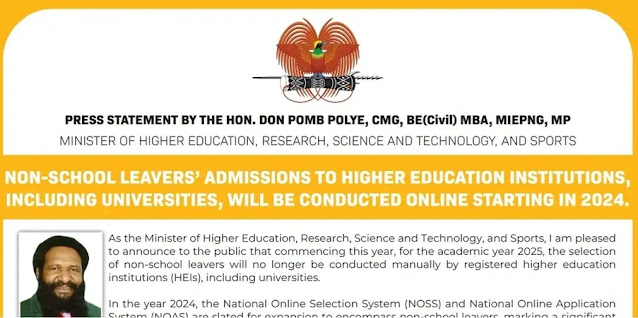Papua New Guinea's (PNG) politics is lighting up with a whirlwind of activity leading up to May 2024. The Opposition, under the leadership of Douglas Tomuriesa, has declared its intention to table a fresh motion of no confidence against the incumbent Prime Minister, James Marape, in the parliamentary session scheduled for May 28.
This is not the first time such a motion has been tabled, with previous attempts providing valuable context for this latest development.
The Power of the Vote of No Confidence (VONC)
The VONC is a potent instrument at the disposal of the opposition, enabling them to question the authority of the current Prime Minister. The forthcoming motion on May 28 marks the fourth such notice lodged by the PNG Opposition. But, this time, the nomination of East Sepik Governor Allan Bird as the potential Prime Minister is NOT made clear.
The Acting Speaker, Koni Iguan, has been instrumental in this process. He has guided Tomuriesa to present a new motion, signifying that the opposition has the Speaker's approval to proceed with the vote. This counsel aligns with the parliamentary protocol, which mandates that the Private Business Committee (PBC) convenes on Wednesday 29th May 2024 to review all motion notices.
The Importance of Timing
The timing of the submission is pivotal. If the VONC notice is lodged on May 28, a Tuesday, the PBC is likely to deliberate on it the next day, May 29. Conversely, if the notice is submitted on May 29, the PBC would probably discuss it on the subsequent Wednesday, June 5. Once the committee approves the notice, it will be handed over to the clerk for presentation to the parliament.
PNG's political climate is volatile and subject to rapid changes. The opposition's move to table a new motion of no confidence could further unsettle the country's political stability. This development coincides with a period of uncertainty for Marape's leadership, as government MPs anticipate the resolution of internal issues within the ruling Pangu Party.
The potential consequences of this ongoing political instability, such as impacts on the economy and, infrastructure and social programs, are significant and warrant close attention.
Is Pangu Pati Intact?
Despite denials from prominent political figures, Deputy Prime Minister John Rosso and Finance Minister Rainbo Paita have categorically refuted any internal discord, dismissing such allegations as the handiwork of "fake social media spin doctors".
They asserted that the Pangu Party is not up for grabs and challenged critics to wait until 2027 if they wished to question the party's authority. They also encouraged the opposition to propose alternative national policies.
Foreign Affairs Minister Justin Tkatchenko recently reinforced the party's position, asserting that the government remains robust under Marape's leadership. However, there are dissenting voices within the Pangu Party, suggesting potential cracks in its facade.
Conclusion
The impending VONC in PNG's May Parliamentary session is a crucial event in the nation's political landscape. It underscores the dynamic and fluid nature of PNG politics, where power dynamics can shift swiftly, and leadership roles are frequently contested.
As the VONC date draws near, all eyes are on the PNG Parliament, keenly observing the unfolding political manoeuvres.
The question on everyone's mind is: "Will the current Prime Minister, James Marape, defy the odds and overcome the looming Vote of No-Confidence against him and his government?" Only time will tell.




